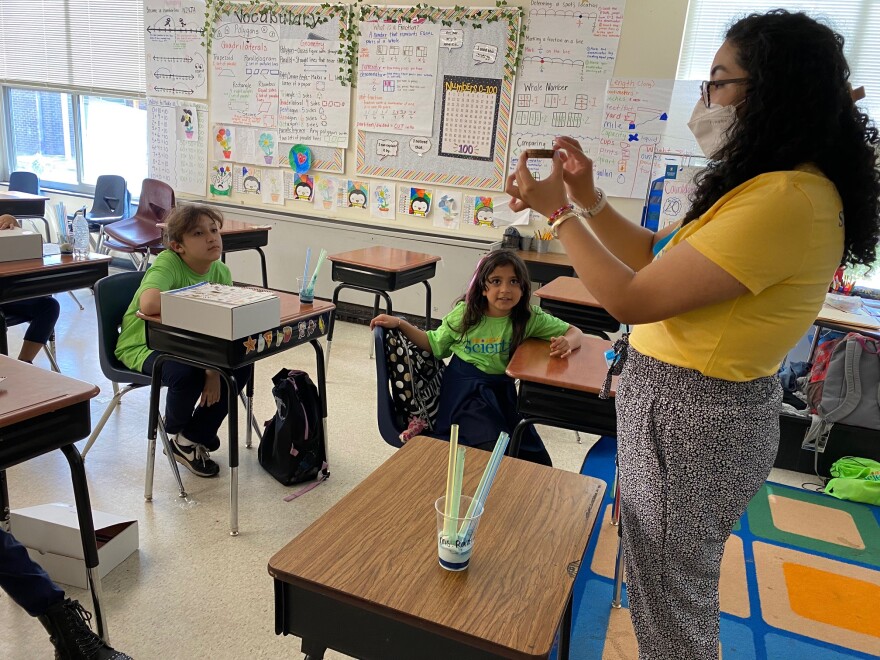A national STEM club for girls that got its start in Charlotte is branching out into classes conducted in Spanish, with plans to take the program international.
Project Scientist started small in Charlotte, when founder Sandy Marshall hosted a math/science summer program at her house. Since 2011 it has expanded into summer camps and after-school programs in California, Georgia, Minnesota and Texas.
A new twist took place this spring at Devonshire Elementary School in east Charlotte. Nine girls learned about climate change and icebergs, with discussions and activities conducted in Spanish.

Devonshire teacher Zarett Ramirez, a native Spanish speaker, eagerly signed on to lead the sessions.
"Honestly, this is why I came into teaching is to be with Hispanic children, being with them and seeing that they can be whatever they want to be in this world," she said.
The girls made "glaciers" in cups using clay and blue ink, then simulated ice-core sampling with plastic straws. They added mealworms and other items to represent things that might turn up in ice.
Fourth-grader Jeaninne Duarte described her work.: "I might take notes if it has worms, or dirt, or sand or rocks. So right now I’m looking at one of the glaciers and I’m about to take notes on what they have."
Seeing women in action
Hands-on science experiments are coupled with exposure to women working in STEM fields. On the final day of the Devonshire club, they heard from Ana Llanos, an engineer with Trane Technologies in Charlotte.

A native of Ecuador, she told the girls about growing up in Canada and living in various cities. She also talked about her work designing heating and air-conditioning systems.
"I just think it’s so important to pay it forward to little girls, the way that I feel a lot of my teachers did for me when I was younger," Llanos said.
Susannah Barr, chief program and impact officer with Project Scientist, said the pandemic forced the group to rethink some of its strategies. Pre-pandemic, the sessions were held on college campuses. During the pandemic kits were mailed to students’ homes, with teachers working remotely.
"So coming out of the pandemic we are now looking at meeting students where they are, and they’re in their schools," Barr said.
Reaching the underrepresented
And there’s a growing recognition that the work can’t just be about reaching girls, Barr says. Women made up only about 30% of scientists and engineers in a 2015 tally. Black women and Hispanic women accounted for only about 2% each.

"Women are underrepresented in science, and then also knowing that our Black and brown women are underrepresented in science, so that is our target population," Barr said. "To increase the opportunities and the access for scientific learning for our Black and brown women."
In Charlotte-Mecklenburg Schools, 65% of students are Black or Latino. The district has North Carolina’s largest population of students who come from Spanish-speaking homes. Devonshire Elementary is one of 28 schools where more than half the students are classified as Hispanic.
Project Scientist is funded by corporate partners. Trane Technologies, which has facilities in Mexico, is giving $1 million over the next three years to create clubs there. Barr says she hopes students in Charlotte — some of whom still have family in Mexico — will be connected with counterparts across the border.
"One of the things we take from the pandemic is our ability to livestream and to Zoom and to see people in action. We’ve done virtual tours at facilities," Barr said. "So we want to bridge this gap, so that our girls are seeing, even in terms of Mexico, their home country, they’re seeing women who are successful there."
The first Mexican Project Scientist clubs are expected to start this fall. Barr says she hopes the Devonshire girls will be back to connect with them.
Copyright 2022 WFAE. To see more, visit WFAE. 9(MDAzNzE4NjE2MDEyNDcxNzIzNTk2MDZlOQ004))



